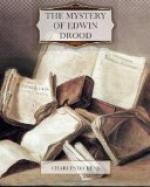As, in some cases of drunkenness, and in others of animal magnetism, there are two states of consciousness which never clash, but each of which pursues its separate course as though it were continuous instead of broken (thus, if I hide my watch when I am drunk, I must be drunk again before I can remember where), so Miss Twinkleton has two distinct and separate phases of being. Every night, the moment the young ladies have retired to rest, does Miss Twinkleton smarten up her curls a little, brighten up her eyes a little, and become a sprightlier Miss Twinkleton than the young ladies have ever seen. Every night, at the same hour, does Miss Twinkleton resume the topics of the previous night, comprehending the tenderer scandal of Cloisterham, of which she has no knowledge whatever by day, and references to a certain season at Tunbridge Wells (airily called by Miss Twinkleton in this state of her existence ’The Wells’), notably the season wherein a certain finished gentleman (compassionately called by Miss Twinkleton, in this stage of her existence, ‘Foolish Mr. Porters’) revealed a homage of the heart, whereof Miss Twinkleton, in her scholastic state of existence, is as ignorant as a granite pillar. Miss Twinkleton’s companion in both states of existence, and equally adaptable to either, is one Mrs. Tisher: a deferential widow with a weak back, a chronic sigh, and a suppressed voice, who looks after the young ladies’ wardrobes, and leads them to infer that she has seen better days. Perhaps this is the reason why it is an article of faith with the servants, handed down from race to race, that the departed Tisher was a hairdresser.
The pet pupil of the Nuns’ House is Miss Rosa Bud, of course called Rosebud; wonderfully pretty, wonderfully childish, wonderfully whimsical. An awkward interest (awkward because romantic) attaches to Miss Bud in the minds of the young ladies, on account of its being known to them that a husband has been chosen for her by will and bequest, and that her guardian is bound down to bestow her on that husband when he comes of age. Miss Twinkleton, in her seminarial state of existence, has combated the romantic aspect of this destiny by affecting to shake her head over it behind Miss Bud’s dimpled shoulders, and to brood on the unhappy lot of that doomed little victim. But with no better effect—possibly some unfelt touch of foolish Mr. Porters has undermined the endeavour— than to evoke from the young ladies an unanimous bedchamber cry of ‘O, what a pretending old thing Miss Twinkleton is, my dear!’
The Nuns’ House is never in such a state of flutter as when this allotted husband calls to see little Rosebud. (It is unanimously understood by the young ladies that he is lawfully entitled to this privilege, and that if Miss Twinkleton disputed it, she would be instantly taken up and transported.) When his ring at the gate-bell is expected, or takes place, every young lady who can, under any pretence, look out of window, looks out of window; while every young lady who is ‘practising,’ practises out of time; and the French class becomes so demoralised that the mark goes round as briskly as the bottle at a convivial party in the last century.




